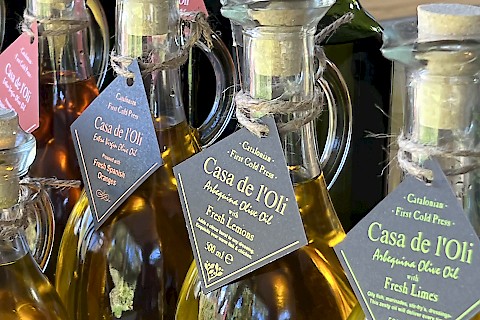Why do we need antioxidants? We know that they are good for us, but why do we need them?
Why are antioxidants found in Vegetables, Salads and Fruit so vital for your health?
Source: Laura Aston, Biocare
Why do we need antioxidants? We know that they are good for us, but why do we need them? Why are they so crucial to help with preventing chronic disease and the ageing process? We use the term a lot, but do we understand what it actually means and its implications for health? Let’s take a look…
An antioxidant is basically something that reverses or stops ‘oxidation’. But what exactly is oxidation?
In scientific terms, oxidation is the gain of oxygen by a substance. Imagine a freshly cut apple or avocado turning brown, a nail becoming rusty or a copper statue turning green. These are examples of everyday oxidation. In most instances the process of oxidation causes damage or destruction.
Oxidation creates free radicals, boisterous molecules that have been freed from their usual home to go and cause damage and destruction in the body. These free radicals are unstable and need to be ‘caught’ before they can cause more damage to other healthy functioning cells. These free radicals negatively affect cell membrane health, proteins, and DNA expression which can trigger a number of human diseases. Antioxidants are our natural protectors.
Antioxidants are abundant in nature, because plants contain antioxidants to protect themselves too. The nutritional content of natural whole foods is just what our body needs to negate the effects of our own biochemical processes. However we sometimes struggle to obtain sufficient antioxidants in the modern world due to a nutritionally deficient society – due to urbanization, overuse of agricultural land, intensive farming, stress-fueled society and easy access to processed foods, we are unable to provide our body with the essential nutrition required to defuse this free radical activity.
Not only do free radicals naturally occur in the body, we can also absorb them from our environment. This can be from consumption burnt or fried foods or exposure to chemicals as pesticides in the home, cosmetic and domestic products and various other sources through our environment.
Antioxidants are therefore vital for our health as they are implicated in healthy ageing, reducing the virulence of chronic disease, improving cognition and mental health. Ultimately they work to maintain and improve general health and wellbeing.
So what can we do to protect ourselves?
* Eat organic and/or local produce as much as you can afford. Look out for the ‘dirty dozen’ and ‘clean fifteen’ as a basis.
* Base your diet on whole foods in forms of fresh fruit and vegetables and good quality protein
* Minimize and ideally eliminate processed foods, usually void of any antioxidant nutrition.
* Keep a healthy mind by staying hydrated and maintaining good balance between work and home.
* Look after your gut. A healthy gut is a healthy body!
Include key nutrients in your diet that help support high antioxidant activity, such as:
* Turmeric - containing the active ingredient curcumin. This spice is known, improving cognition and reducing the signs of ageing.
* Vitamin C - improves immune cell function (neutrophils & lymphocytes), [1] reduces tiredness and fatigue, acting as a co factor for iron absorption [2]and supports collagen formation. [3]
* Vitamin D - appears to enhance innate immunity and inhibits the development of autoimmunity[4].
* Zinc – supports enzymic activity in the body[5] and regulates immune cells.[6]
* Bilberry – Acts as a natural anti-inflammatory agent[7]supports circulation and strengthens capillaries[8]
* Hesperidin – supports cardiovascular function, protects our muscles and bones[9] and reduces inflammation. [10]
* Rutin – Found to be an effective free radical scavenger [11] [12]and supports circulation. [13]
* Grapeseed extract (as Vitaflavan®) - an excellent source of oligomeric proanthocyanidins (OPCs). These antioxidant molecules have approximately 50 times more free radical scavenging ability than vitamins C and E.
* Manganese – works as a key part antioxidant enzymes in the mitochondria [14]which are like the batteries of the cell.
* Probiotics[15] – along with all the other reputed benefits of probiotics for digestive and immune health the friendly bacteria in our gut have been associated with reduced oxidation and inflammation.
* Quercetin - One of the most potent antioxidants that is used often by nutritionists to support normal histamine release and support an overactive immune system.
* Rosehip – this is the whole berry fruit from the rose plant. It is abundant in nutrients including vitamin C, providing high antioxidant activity.[16]
References
[1] Tauler et al. Differential response of lymphocytes and neutrophils to high intensity physical activity and to vitamin C diet supplementation. Free Radic Res. 2003; 37:931-8.
[2] Hallberg L, Brune M, Rossander L. The role of vitamin C in iron absorption. Int J Vitam Nutr Res Suppl. 1989;30:103-8.
[3] Boyera et al. Effect of vitamin C and its derivatives on collagen synthesis and cross-linking by normal human fibroblasts. Int J Cosmet Sci. 1998; 20 (3): 151-8.
[4] Griffin, M.D., Xing, N. and Kumar R. (2003) Vitamin D and its analogs as regulators of immune activation and antigen presentation. Annual Review of Nutrition, 23, 117-145.
[5] Sandstead HH. Understanding zinc: recent observations and interpretations. J Lab Clin Med 1994;124:322-7.
[6] Encyclopedia of Human Nutrition. Caballero B, Allen L, Prentice A (eds.). Academic Press, San Diego, 447-454
[7] Triebel et al. Modulation of inflammatory gene expression by a bilberry ( Vaccinium myrtillus L.) extract and single anthocyanins considering their limited stability under cell culture conditions. J Agric Food Chem. 2012; 60 (36): 8902-10.
[8] Mian E et al Anthocyanosides and the walls of microvessels: Further aspects of the mechanism of action of their protective in syndromes due to abnormal capillary fragility. Minerva Med 1977;68:3565–81.
[9] Balakrishnan, Menon. Effect of hesperidin on matrix metalloproteinases and antioxidant status during nicotine-induced toxicity. Toxicology. 2007; 238 (2-3): 90-8.
[10] In-Young Choi et al. Hesperidin inhibits expression oh hypoxia inducible factor-1 alpha and inflammatory cytokine production from mast cells. Molecular and cellular biochemistry 2007; pp153-161
[11] Kostyuk VA, Potapovich AI. Antiradical and chelating effects in flavonoids protection against silica induced cell injury. Arch Biochem Biophys 1998 Jul 1;355(1):43-8
[12] Escarpa A, Gonzalez MC. High performance liquid chromatography with diode-array detection for the determination of phenolic compounds in peel and pulp from different apple varieties. J Chromatogr A. 1998 Oct 9;823(1-2):331-7
[13] Clement D L. Management of venous edema: insights from an international task force. Angiology. 2000; 51:13-17
[14] Leach RM, Harris ED. Manganese. In: O'Dell BL, Sunde RA, eds. Handbook of nutritionally essential minerals. New York: Marcel Dekker, Inc; 1997:335-355.
[15] Lamprecht M et al. Probiotic supplementation affects markers of intestinal barrier, oxidation, and inflammation in trained men; a randomized, doubleblinded, placebo-controlled trial. J Int Soc Sports Nutr. 2012 Sep 20;9(1):45.
[16] Tumbas et al. Effect of rosehip (Rosa canina L.) phytochemicals on stable free radicals and human cancer cells. J Sci Food Agric. 2012 Apr; 92 (6): 1273-81.
SHARE WITH FRIENDS
More News



